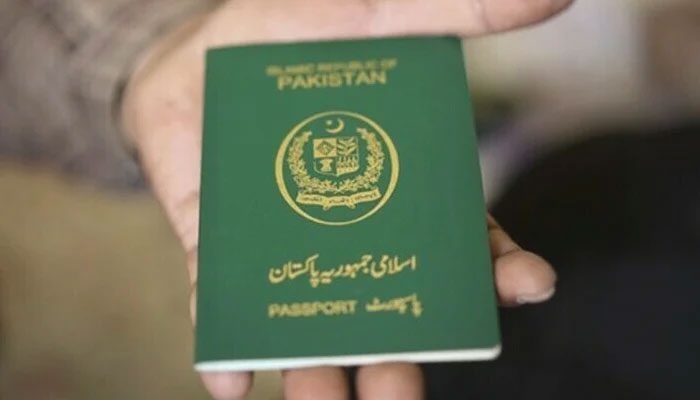Pakistan’s passport at 100th position among 103 countries
Pakistan stands at the 100th position with on-arrival visa access to just 33 countries in July 2023
KARACHI: The Pakistani passport has once again been ranked as the world’s fourth-worst (100th position out of 103) in the world, according to the Global Mobility Report 2023 published by Henley & Partners on Tuesday.
While the position of the country remains unchanged from last year’s ranking, Singapore has overtaken Japan and now enjoys the title of the world’s most powerful passport.
The global passport ranking is based on the number of countries/ destinations passport holders can access without a prior visa. Its score reflects the number of destinations where a country’s passport holders can have visa-free access.
Singapore has a score of 192, which means Singaporean passport holders can now enjoy visa-free entry to 192 destinations out of 227 in the world. The Pakistani passport offers visa-free entry to 33 destinations.
Japan, which topped the 2022 list, now stands on the third spot. Its passport holders can now access 189 countries without a visa, a significant drop from the earlier 193. Austria, Finland, France, Luxembourg, South Korea and Sweden join Japan in third place with access to 189 destinations without a prior visa.
Iraq, Syria and Afghanistan have become the world’s weakest passports with a score of 29, 30 and 27 respectively. Pakistan’s archrival and neighbour India ranks 80th, and its passport holders can have visa-free access to 57 destinations.
Pakistani passport holders can travel to these locations without a visa: Barbados, Cook Islands, Micronesia, Niue, Vanuatu, Dominica, Haiti, Montserrat, St Vincent and the Grenadines, Trinidad and Tobago. They can enjoy the visa-on-arrival facility in these countries: Palau Islands, Samoa, Tuvalu, Qatar, Cambodia, Maldives, Nepal, Timor-Leste, Burundi, Cape Verde Islands, Comoro Islands, Guinea-Bissau, Madagascar, Mauritania, Mozambique, Rwanda, Senegal, Seychelles, Sierra Leone, Somalia, Tanzania, and Togo. The new entrant in the list is Barbados.
The press statement by Henley & Partners says general trend over the history of the 18-year-old ranking has been towards greater travel freedom, with the average number of destinations travelers are able to access visa-free nearly doubling from 58 in 2006 to 109 in 2023.
However, the global mobility gap between those at the top and bottom of the index is now wider than it has ever been, with top-ranked Singapore able to access 165 more destinations visa-free than Afghanistan.
-
 Andrew Mountbatten-Windsor In A Fix Over New Disturbing TMZ Photos
Andrew Mountbatten-Windsor In A Fix Over New Disturbing TMZ Photos -
 Eric Dane Opened Up About Releasing His Memoir Just Two Months Before His Death Due To ALS Complications
Eric Dane Opened Up About Releasing His Memoir Just Two Months Before His Death Due To ALS Complications -
 Zendaya, Tom Holland Already Married? Actress Shows Off New Ring
Zendaya, Tom Holland Already Married? Actress Shows Off New Ring -
 King Charles Holds Emergency Meeting After Andrew Arrest: 'Abdication Is Not Happening'
King Charles Holds Emergency Meeting After Andrew Arrest: 'Abdication Is Not Happening' -
 Amazon Can Be Sued Over Sodium Nitrite Suicide Cases, US Court Rules
Amazon Can Be Sued Over Sodium Nitrite Suicide Cases, US Court Rules -
 'Vikings' Star Mourns Eric Dane's Death
'Vikings' Star Mourns Eric Dane's Death -
 Patrick Dempsey Reveals Eric Dane's Condition In Final Days Before Death
Patrick Dempsey Reveals Eric Dane's Condition In Final Days Before Death -
 'Heartbroken' Nina Dobrev Mourns Death Of Eric Dane: 'He'll Be Deeply Missed'
'Heartbroken' Nina Dobrev Mourns Death Of Eric Dane: 'He'll Be Deeply Missed' -
 Andrew Mountbatten-Windsor’s Arrest: What Happened When A Royal Was Last Tried?
Andrew Mountbatten-Windsor’s Arrest: What Happened When A Royal Was Last Tried? -
 Alyssa Milano Expresses Grief Over Death Of 'Charmed' Co-star Eric Dane
Alyssa Milano Expresses Grief Over Death Of 'Charmed' Co-star Eric Dane -
 Prince William, Kate Middleton Camp Reacts To Meghan's Friend Remarks On Harry 'secret Olive Branch'
Prince William, Kate Middleton Camp Reacts To Meghan's Friend Remarks On Harry 'secret Olive Branch' -
 Daniel Radcliffe Opens Up About 'The Wizard Of Oz' Offer
Daniel Radcliffe Opens Up About 'The Wizard Of Oz' Offer -
 Channing Tatum Reacts To UK's Action Against Andrew Mountbatten-Windsor
Channing Tatum Reacts To UK's Action Against Andrew Mountbatten-Windsor -
 Brooke Candy Announces Divorce From Kyle England After Seven Years Of Marriage
Brooke Candy Announces Divorce From Kyle England After Seven Years Of Marriage -
 Piers Morgan Makes Meaningful Plea To King Charles After Andrew Arrest
Piers Morgan Makes Meaningful Plea To King Charles After Andrew Arrest -
 Sir Elton John Details Struggle With Loss Of Vision: 'I Can't See'
Sir Elton John Details Struggle With Loss Of Vision: 'I Can't See'




